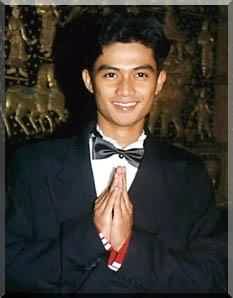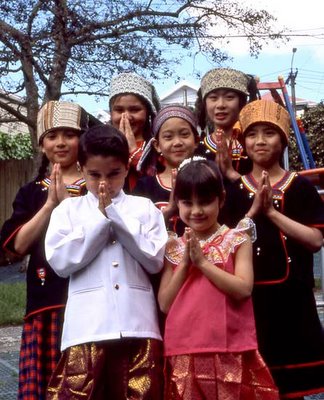Think again!
The hands. It's more than just flat hands held against each other. The wai is supposed to represent a lotus bud, which also figures prominently in Thai culture. Therefore, the hands are ever so slightly cupped to give that "bud" appearance. The kids in the picture above are still in training, so don't mimic them. You need a more rounded look to your hands position. The guy below has it right.

The vertical position of hands. Depending on the status of the person to whom you are wai-ing, you demonstrate the appropriate honor by the height of your wai. This is a bit tricky. You also have to take into account your own status. So many factors come into play here: age, position, relationship, economic status, social status, etc. You have to roll it all into one and then demonstrate your wai to match the situation.

The lowest wai is with the tips of the fingers at about mid-chest level. The highest wai, given to the King, are hands and arms way above the head with head and neck bent backward at a very awkward angle. Then, there's a half-dozen positions in between these extremes: tips of fingers at chin, at mouth, at bottom of nose, at top of nose, mid-forehead, etc.
 The position of the head. While doing the wai there are variations from keeping your head unbent, to a deep Japanese-style bow. Which do you use? The more head-movement downward, the greater honor being given. It's all part of that status thing. As if that wasn't enough, then there's....
The position of the head. While doing the wai there are variations from keeping your head unbent, to a deep Japanese-style bow. Which do you use? The more head-movement downward, the greater honor being given. It's all part of that status thing. As if that wasn't enough, then there's....The timing. It's important who does the wai first. I've been admonished more than once on this point. My first month in Thailand, I had heard how important the wai was, so I was going to be sure NOT to forget it! My secret was to show it to everyone, all the time--and to show my enthusiasm for their culture by jumping the gun and doing it first. I went around, doing the wai to up-line status, down-line status, trees, dogs and cats. I thought everyone's giggle was from their delight. No, it was because I looked ridiculous. I was totally unaware of the "timing" angle. Now, I know to let down-line status individuals wai to me first. However, I need to be quick-thinking to initiate the wai to up-line status persons, lest I offend them.
Get it right, and you earn the approval and pleasure of the person you seek to honor. Get it wrong, and you risk embarrassing, or at worst, insulting the other person. Fortunately, we foreigners are granted, what I call "farang's license" to mess up. Just the effort is appreciated. However, if you've been in Thailand for some years, it's expected that you'll stop being a dunce and start getting it right!
OK, start practicing, class! The quiz is on Friday. Flunk the quiz? Lose your visa. Pass the quiz? Earn a Thai's undying appreciation for taking the time to learn his or her culture!
crocodiles reside in Thailand.
(At the gates of my local village's
temple)
c




3 comments:
Well writen ! I'd already forgoten about making the lotus shape with your hands .. hmmm....
Nice to see you going on!!
Thanks for the encouragement JD and not loosing hope on me. I have had 25 days out with many an event. But somehow I am not getting to write. My words fall into space filled with deafening silence.... But I will soon!!!
I think Farang get away easily for everything.....
As a Malaysian who speaks Thai, I always get the look when everybody thinks that I am Thai, but yet he still behaves somewhat differently.... hee he
weird or not....
but, to wai is so common in Asian culture, but not among the Chinese in Malaysia
among the Malaysian Chinese, the wai is reserved only for the Buddhist Clergy
surprisingly, the wai is also practice by the Malays, but only when meeting Malay Royalty, and it is call 'sembah' which means to pray and praise.... a Hindu leftover
Post a Comment